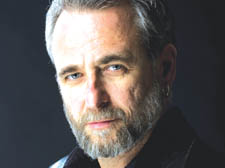|
|
 |
| |

Ari Folman |
Conflicting emotions and the Lebanese war
JEWISH FILM FESTIVAL
DIRECTOR Ari Folman was barely 20 when the 1982 Israeli-Lebanese war began. A conscript in the Israeli army, he found himself thrust into active duty.
Twenty-six years later, he has revisited this formative and harrowing experience as a film-maker, and his animated documentary, Waltz With Bashir, is one of the highlights of this month’s Jewish Film Festival.
A powerful anti-war movie, Waltz With Bashir tackles a hugely complex subject. Folman considers the terrible massacre of Palestinian refugees during the war, who was responsible for it, and the lasting effect war has on people.
The Lebanese war has inspired great anti-war films – also showing at the festival is the 1991 movie Cup Final, which tells the story of a conscript kidnapped by an armed gang who hope to take him and his comrades to Beirut and use them to swap with fighters the Israelis had captured.
In Folman’s film, the individual is all: he has tacitly avoided wider political discussion of the rights and wrongs and the political motivation behind the conflict.
“I took the decision not to deal with the Israeli political leadership and their responsibility because it is already known,” he says. “I was interested in me and my friends.”
The opening sequence reveals how the film came about – a gang of vicious dogs come storming towards the viewer. It was a recurring dream that plagued the nights of his comrade Boaz. When Folman met Boaz recently in a bar and heard about the dream, it was obvious it was linked to the horrendous experiences they had shared. Boaz was a sensitive soldier and could not bring himself to raise his gun against others. The unit instead asked him to shoot the dogs that stood guard in Lebanese villages to stop them barking and giving away their positions.
The meeting prompted Folman to track down his former fellow soldiers. Some were less willing to speak than others.
“The more they were related to me, the more they knew me, the less they wanted to take part,” he says. “I found the people who had been in the same situation as I had, but did not know me personally, were much more willing to talk.”
Folman believes this may have something to do with the circles he mixes in.
“Some of my friends think they are very clever and left wing and artistic – they are simply not the kind of guys who want to tell their war stories,” he says. “They did not want to be there in the first place, much less revisit it all these years later.”
The film stands out not just for the material, but how it is presented.
Folman could have made a film full of former soldiers telling their stories, but he felt this would not engage the viewer. But most importantly, he would be unable to portray the horror of the memories that still haunt those involved.
“It was the only way to tell the story,” he says. “It deals with subjects such as memory loss, dreams, the subconscious, hallucinations, drugs. Using animation gives you freedom – you are filming in a free zone.”
Making the film has helped Folman recover memories his mind had previously blocked out.
“It’s not really amnesia as such,” he says. “You remember, but you filter out some things you don’t want to think about. You know some things, but then there are breaks in between of things you do not want to feel.”
And for a virulently anti-war film, he was surprised to find it well-received back in Israel.
“The government helped send it all over the world,” he says. “They thought it showed Israel as a tolerant country. The basic statement I am making in this film is that war is useless and stupid. There is no glamour, no glory. I hope this is clear.”
•
|
 |
|
 |
| |
|
 |
|

